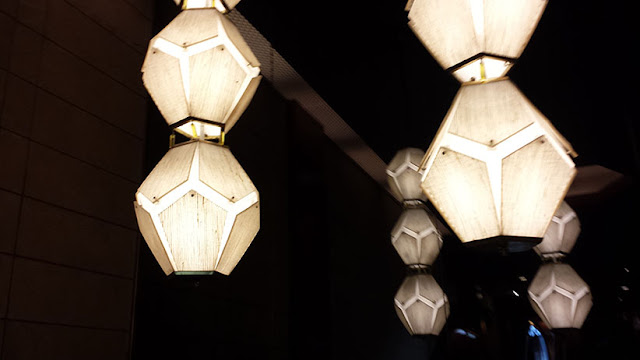Much has been written about the upcoming demolition of
Tokyo's landmark Hotel Okura's main building ever since it was announced in May
last year. Widely met with incomprehension that a hotel generally described as
a "modernist masterpiece" would be so cruelly dispensed with, it even
prompted a "Save the Okura" online petition by Monocle's Tyler Brulé.
Sadly, all outcries were ignored by the owners who are pushing ahead to make
way for a 38-storey mixed use development which will include a 550-key hotel,
re-imagined for our times and in time for the 2020 Tokyo Olympics.
I was fortunate to have stayed at the Okura many times over
the years, and again last week, which gave me the opportunity to reminisce and
for one more time enjoy the totally unique atmosphere of this soon to disappear
landmark.

More images of the Hotel Okura below.
So why not the Okura? Isn't it enough that it was the first
'international' hotel in Tokyo, that it played host to an impossibly long list
of celebrities from all walks of life and - most importantly - that its
architectural vision, inside and out, exemplifies mid 20th century modernist
architecture in an accessible way? Well, apparently not.
But perhaps looking at the point in time when it was built provides
a clue here. All the aforementioned hotels were built in the late 19th or early
20th century in that opulent, colonial style that we now associate with 'grand'
and 'old world'. That there has not been another style that has similarly taken
our imagination since is profoundly sad. The Peace Hotel symbolises a point in
time in the past, the glories of the colonial empire long lost, but now brought
back to glory in capitunist China, no less.
Why the Hotel Okura should not be
awarded the same respect is incomprehensible to me. Is the workmanship really
that shoddy that it cannot be renovated? Tokyo, after all, is deepest
earthquake territory which would have, even in the early 1960s, ensured quality
workmanship (not to mention that we are talking about Japan here, the one place
where workmanship to this day is taken extremely seriously). While the guest
rooms have been renovated rather uninspiringly over the years, judging from how
meticulously the interior of the lobby area has been designed and preserved,
this hotel was built with longevity in mind.
But perhaps people at large simply aren't that much into
modernist architecture, Mad Men not withstanding. Nice to look at, but for my money please give me something else.
 With the main building confirmed to be closing for the last
time on 1 August, I guess it is futile to go on about it. The less spectacular
South Wing of the building, which was added in 1973 and will be spared the
wrecking ball (for now), is due for a quick spruce up from 1 July until 1
August and will serve as the hold out hotel until the new tower is finished in
2019, so you can still get a little whiff of the Okura magic until then. And if
you can't make it, take a tour of the hotel below.
With the main building confirmed to be closing for the last
time on 1 August, I guess it is futile to go on about it. The less spectacular
South Wing of the building, which was added in 1973 and will be spared the
wrecking ball (for now), is due for a quick spruce up from 1 July until 1
August and will serve as the hold out hotel until the new tower is finished in
2019, so you can still get a little whiff of the Okura magic until then. And if
you can't make it, take a tour of the hotel below.
















